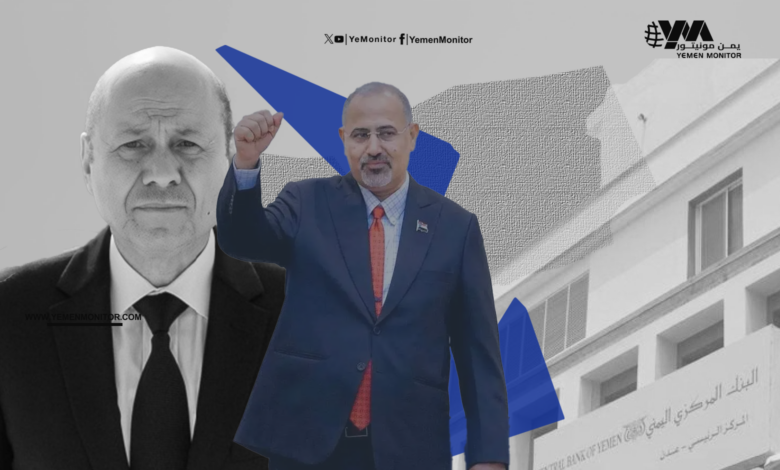
Yemen Monitor/Special Writings:
The statement issued by the Central Bank of Yemen in Aden was not merely a financial warning of the severity of the economic situation, but carried within it an explicit condemnation of the “Presidential Leadership Council” authority, accusing it of failure and corruption in managing financial resources, and the absence of any effective steps to address the crisis.
The most prominent manifestations of failure and corruption of the authority, which derives its legitimacy solely from international recognition, are the incorrect direction of revenues, the absence of oversight, and the continued collection of resources in channels outside the control of the central bank, which has deepened the economic and living crisis for citizens.
The authority can no longer justify the collapse by the cessation of oil exports, especially after the bank confirmed that it had submitted proposals to address the crisis and reduce its impact on salaries and basic services, but they were met with disregard, leading to further economic deterioration.
Moreover, the authority did not take any real measures to benefit from the available sovereign resources, but left them vulnerable to waste, at a time when the severity of the crisis could have been alleviated by strengthening local revenues, and this reveals the absence of a clear economic vision.
One of the most serious issues revealed by the statement is that government revenues are not transferred to the general account in the central bank, but are collected in unofficial financial vessels or private accounts, which indicates the spread of financial corruption and the absence of government oversight. Therefore, the bank stressed the need to stop these illegal practices, and obligate government agencies to deposit all revenues into the central bank to ensure their distribution according to national priorities.
The bank did not only point out the collection of revenues outside the framework of the state, but also confirmed that the available resources were not used according to the correct priorities. The absence of financial planning led to chaos in public spending and the collapse of basic services.
This statement adds further evidence of corruption after the report of the Central Organization for Control and Accounting, of which the authority only published a small part, and confirms that corruption is the main problem and not the scarcity of resources, although the latter is also a problem.
What should be pointed out in the bank’s statement is its talk about a very serious issue, which is the almost complete absence of officials responsible for addressing the economic crisis, which reflects the weakness of political will and the existence of internal conflicts that hinder the taking of decisive decisions.
In light of this bleak scene, popular discontent is escalating with the continued economic deterioration and the absence of any serious move by the authority to address the crisis.
What is unfortunate in this context is the weak effective role of professional and labor unions, whose activities are limited to ineffective boundaries, and worse, the parties, especially those that were in the opposition and joined the February 11, 2011 revolution under the pretext of fighting corruption and failure, worked to domesticate public opinion, which reveals that their goal was not reform and change, but to obtain a greater share of power.
If the situation continues as it is, which is likely, it may lead to the collapse of the currency, rising poverty and inflation rates, and perhaps an escalation of the wave of popular anger, which may redraw the balance of power in the Yemeni political scene.
The Central Bank statement is not just a warning, but a real test for the authority: either take urgent measures to save the economy, or face repercussions that may be catastrophic on both the political and economic levels.





